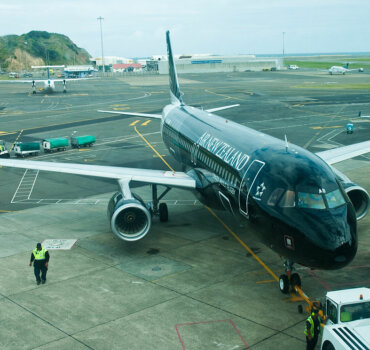
Image via Phillip Capper licensed under CC

Image via Phillip Capper licensed under CC
A recent article on immigration in a daily newspaper had a provocative headline: ‘Optimum Population: Govt Immigration Statement should allow 4 million more people’.
One argument was that New Zealand currently has two job vacancies for every unemployed person. Workforce shortages are a handbrake on economic growth and a contributor to inflation. Another argument is that New Zealand needs to have a much larger population, or we will remain a high-cost economy with many poor public services. We miss out on economies-of-scale in many areas.
There are strong arguments against such a policy also. It would change the nature of New Zealand society and it is likely have negative environmental impacts. Some people also point out that countries don’t have to be big to succeed. Four of the 10 countries with the highest per capita GDP in the world have a smaller population than New Zealand (Luxembourg, Ireland, Qatar and Brunei), and another five of them have populations between five and nine million (Singapore, Switzerland, Norway, Hong Kong and Denmark).
The New Zealand Productivity Commission published a report on ‘working-age immigration policies for New Zealand’s long-term prosperity and well-being’. The report said that although the New Zealand economy had grown strongly over the last 20 years, New Zealand’s productivity performance has been poor. New Zealand’s economic growth had come about by adding more people to the labour force and by those workers working longer hours compared with other developed countries. While these things lead to economic growth, they don’t lead to improvements in living standards – improvements in productivity do that.
Continuing with the policy of getting economic growth primarily by adding more people is not the way to generate higher standards of living in New Zealand.
The Government is about to announce a new immigration policy. One criticism of past immigration policy in the Productivity Report is that it has been too short-term and subject to frequent change. This has made planning difficult for both New Zealand businesses and for potential migrants. A longer-term policy with more certainty and less bureaucracy will be good for everyone.
However, New Zealand isn’t in a position to consider a policy of a large increase in our population at present. The New Zealand Productivity Commission also said that public infrastructure (roads, schools, hospitals etc) has not kept up with population growth over the last 20 years.
The estimated value of New Zealand ‘infrastructure gap’ – the value of what New Zealand should have built but has not – is $104 billion.
I don’t know who did this estimate or how they did it. But few would argue that New Zealand does not have a large ‘infrastructure gap’. New Zealand has not been able to manage its public infrastructure investment well in the recent past with modest population growth. A rapid increase in our population would require a coordinated approach to investment across a large number of sectors that would be beyond us.
Also, migration is a two-way flow. At present, a lot of New Zealand workers are seeing Australia as a better prospect. Government policy needs to be focused on making New Zealand a more attractive place for the workers who are already here so that they opt to stay. If New Zealand is seen as an attractive place to live and work by the people that are already here, migrants will be more likely to come.








